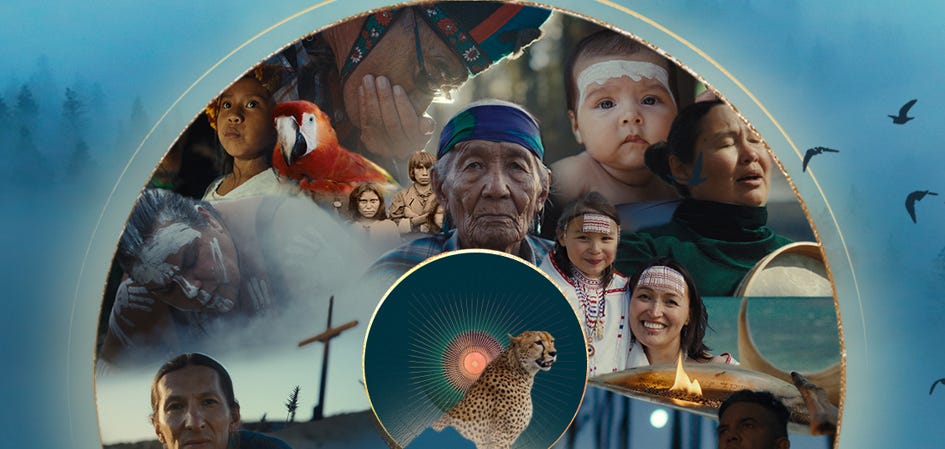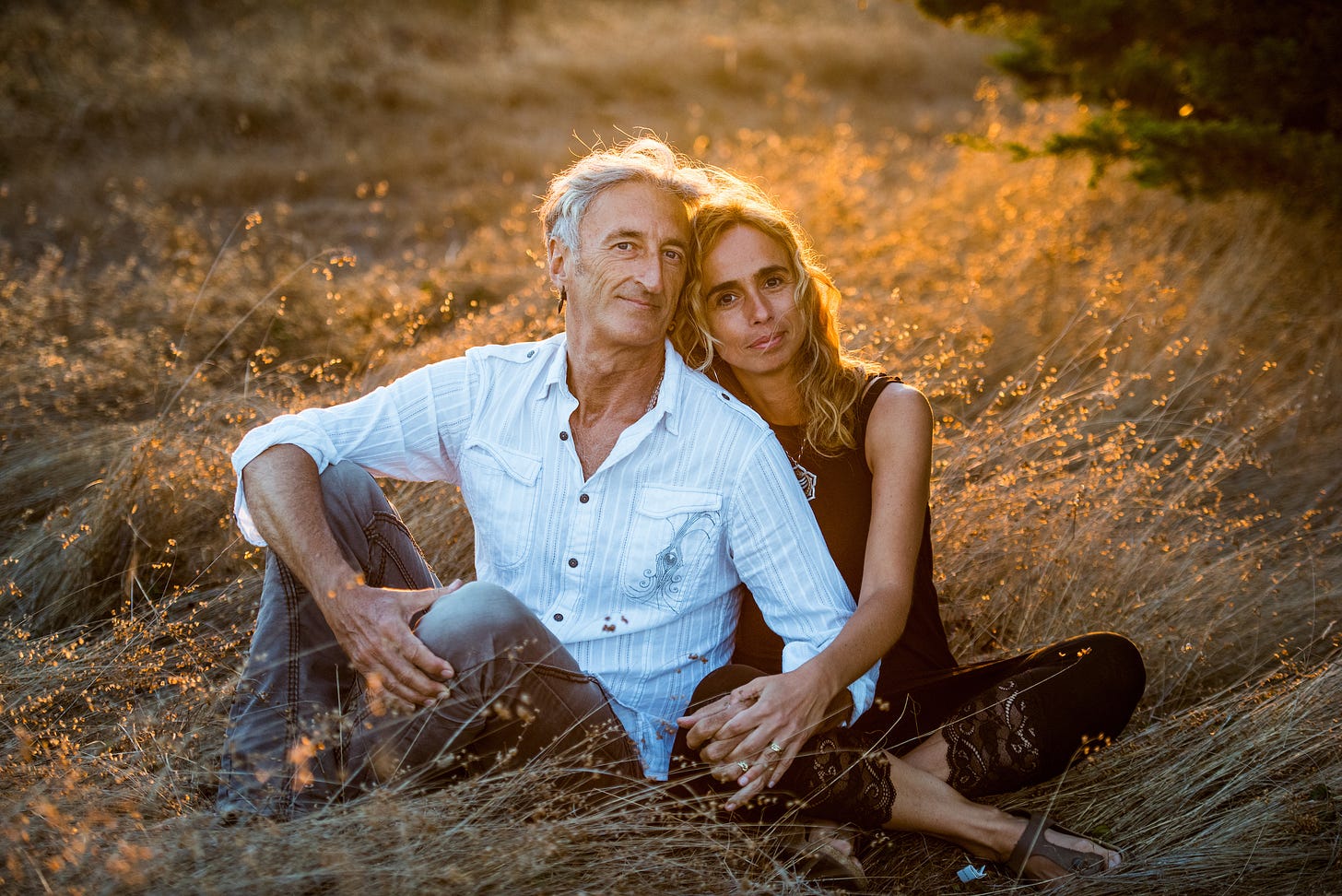The new film, 'The Eternal Song,' is having its world premiere in Sebastopol
A film about indigenous cultures and the costs of colonization premieres at Sebastopol Center for the Arts this Thursday
Sebastopol filmmakers Zaya and Maurizio Benazzo are releasing their newest film, The Eternal Song, this week. The film looks at the effects of European colonization on 13 indigenous cultures from the Arctic to Africa to the Amazon. The Eternal Song is having its world premiere at the Sebastopol Center for the Arts on Thursday night, May 8, at 6:30 pm.
It’s a beautiful and disturbing film, focusing not only on the persecution of indigenous societies over the last 400 years, but on modern indigenous individuals still dealing with the generational trauma that came in the wake of that persecution.
Interestingly, the film places most of the blame on the imposition of Christianity—mainly through tribal schools run by the Catholic Church and other Christian missionaries. Capitalism and militarism get brief mentions, but the film seems to identify Christianity as the main source that severed people—both colonizers and colonized—from their connection with the earth, which is key to most indigenous religions. For many of the film’s protagonists, the path to restoration comes through the re-adoption of indigenous spiritual practices, be they Inuit, Amazonian or Yoruban.
Maurizio moved to the US from Italy in 1984. Zaya is from Bulgaria.
Last year, the couple released the film, “Where Olive Trees Weep,” about the plight of Palestinians in the West Bank, which was filmed before the October 7th massacre in Israel. Both that film and The Eternal Song were outgrowths of the Bennazos’ organization, Science and Non-Duality (SAND), which produces community gatherings, podcasts, articles, and films.
SAND’s website describes its mission like so: “In our view, the disconnect from Earth-based, indigenous wisdom began in the very early days of humankind, when male-dominated religions replaced fertility goddess worship as the prevalent cultural vehicle and started pitting humanity against its natural environment. Separation was born: me vs you, us vs them, human vs nature. It was, in a way, an unavoidable consequence of the rise of the Mind and its discriminating function. Much later, with the Scientific Revolution, the liberation of science from religion resulted in tremendous technological advances, but it also led to the fragmentation of knowledge, and to a science no longer engaged with the big questions of what it means to be human, to be conscious, and interconnected.” (See their full mission statement here.)
Yesterday, the Sebastopol Times spoke with Zaya and Maurizio about their experience of making their new film, The Eternal Song, and what they hoped people would learn from it.
What do you hope viewers will take away from their experience of the film?
ZAYA: A few things: To grapple a little bit with the history of colonization and the impact of colonialism through real stories, through human stories—not in history books, the way it's written—but on the human heart, from heart to heart. So that's one. The other one is to understand how our Western mindset is one template to understand life and reality. Indigenous people have very different ways of understanding life and reality. So to expand the Western mindset to include different ways of being, knowing and relating. And then the third one is, as we grapple with the histories of colonialism, we also need to begin to heal—both those who have been impacted by colonialism, but also those who come from lineages of colonizers. It’s never black and white. We’re not trying to point fingers and do ‘us versus them’. We have to heal together.
So the film is pretty clear on how indigenous people should go about healing themselves—which is basically through their ancestral traditions. It didn’t so much address what colonizers should do.
ZAYA: That’s a whole different movie. But remember, at the end of the movie, one of our characters says, [paraphrasing] ‘I have to find my ancestral roots, you can find yours too. Don’t look in mine. Look in yours. You can use my work and my roots, but to find yours. At some point, all our ancestors were indigenous to some land. So the invitation is to learn. Each one of us should learn about our lineages: the beauty, the discomfort, because it's all of it. You know, we cannot romanticize our ancestors. They made their mistakes, and we have the results of both of their resilience and also of their…not ignorance—what would you use?
MAURIZIO: Oh, ignorance, yeah.
Arrogance, perhaps.
ZAYA: We are asking people, learn about your lineage—when the disconnects from Mother Earth began, because at some point, all the ancestors knew how to live with the earth and how to honor the earth and how to keep that relationship sustainable for the next generation.
Can you tell me about the title, The Eternal Song, and what that represents?
ZAYA: We were wondering whether it would be a song or a dance, because part of indigenous cultures is ceremony, dance, song—everything they do starts with a prayer or sometimes a dance. So ritual, but ritual always includes singing, and so it represents that voice of the indigenous peoples and their wisdom, which is eternal and which will never disappear. It is a song that calls us back to remembering our ways with Mother Nature.
MAURIZIO: Also it is the song of the mother, the song of nature.
You started making this film in 2022, right? What was the thing that you learned that sort of surprised you the most in making this film?
I would say that I was heartbroken—like it was so heavy to sit with the stories and with the pain. It was almost unbearable. My heart was shattered, learning really what happened and what is still happening in many places, in indigenous territories. That’s a big takeaway.
And then also we had to take away our romantic glasses, romanticizing indigenous people, and be with them like human-to-human, allow them to teach us, allow ourselves to be vulnerable with them. The way colonialism has worked, we are either guilty or we romanticize, and healing cannot happen from either of these places.
I will tell you, as a viewer, I thought there was a fair amount of romanticization of indigenous people before the Europeans. This is something that I've sometimes heard from indigenous people themselves, which is: Everything was perfect before you came. And frankly, I doubt that. Like you really would not have wanted to be a neighboring tribe of the Aztecs—that would not have been a nice life. Do you see what I’m saying?
ZARA: Yes, I do. For example, in Hawaii, yes, they had wars before colonialism came. But wars had protocols. Wars had seasons. You had a season of war, and you had a season of peace. Yes, in Greenland, they had fights between villages. But even for the fights, there was a protocol. There was a common ground of understanding. So again, yes, not to romanticize, but we wanted to emphasize that indigenous way of even if there is a war, we still respect Mother Earth first.
There were rules of engagement. It’s not like what we’re seeing right now. You know, innocent people being, for two years, bombarded, helpless [in Palestine]. Where is our humanity? There is no humanity in that, right? That’s not a war— more like a one-way extinction.
I was wondering what the connection was between this film and your last film on Palestine?
MAURIZIO: Actually Olive Trees was the first film of this series. After we finished the film, The Wisdom of Trauma, with Gabor Maté, we were talking, he said, ‘Well, you should make now a movie not about the western ideas of individual trauma, but talk about intergenerational trauma, and go to the indigenous cultures. Go to the indigenous to talk about that.’ And then he said, and ‘By the way, I’m going to Palestine in three weeks to do work with women released from Israeli prisons.’ And we went with him—we went to Palestine.
So that was the idea originally, Olive Trees was designed to be the last movie of the series. So you watch all the movies—The Eternal Song, then you watch the one about Australia, the one about Greenland, Brazil, and Africa. Everywhere is the same story over and over again. So the book of colonialism, the pattern will become very evident. And then, but only then, we were going to put out the Palestinian movie. so that then people, they cannot deny that this is a settler-colonial project.
Then, October 7 happened, and we couldn’t, in our hearts, we couldn’t hold that movie. We had to do something to help, to bring light to the injustice that is happening—so we released it first.
So is there going to be another film in this series?
MAURIZIO: So “The Eternal Song” weaves all the stories we filmed together into one film. Then we have an individual film for each place.
Are they finished?
ZAYA: We have done four or five already, but there will be 11.
MAURIZIO: Everything has been shot. We are in post-production: doing sound, doing music, and color correction.
The plan is we will release them every two months. Let’s say, now The Eternal Song; in August will most likely be the Maori one about New Zealand; after that, it will probably be one about Canada. And then every month and a half, every two months, we release them in the next year.
Is there anything else you want to say? Anything else you want people to know?
MAURIZIO: I really want to say it’s an honor to present our movie to our community. To me, it’s very, very important, because after this, the movie will open in Oakland, in New York, in LA, in Europe, Australia, all over the world. But we wanted to first give a chance to the people we meet every day in the coffee shop, the restaurant and the stores, to see this movie with us.
ZAYA: I have two calls for our audience: Learn the history of the land you live on. Like, learn who was here, who were the original people, what happened to them? There’s the invitation. And then learn about your own personal lineage, like what happened down the line, where the wounding happened, where the separation happened that lives still in us and how that might live in your life?
The Eternal Song is having its world premiere at the Sebastopol Center for the Arts on Thursday night, May 8, at 6:30 pm. The film will be released digitally on June 3. Find out more at https://theeternalsong.org/screenings/



